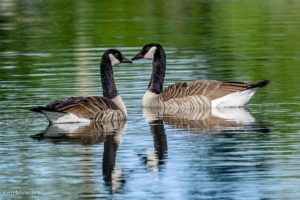By Kate Harris, City of Boise
You may have seen the “Pond Closed” signs at City of Boise ponds this year or heard about the City’s decision to close Esther Simplot Park to dogs. The City closed both Quinn’s Pond and Esther Simplot Park ponds on June 21 due to E. coli concerns. Quinn’s Pond was reopened on June 30th, while Esther Simplot Park ponds remain closed. The City of Boise has a robust water quality sampling program in place, and staff are working to reduce bacteria concentrations and reopen Esther Simplot Park ponds as quickly as possible.

Water Quality Monitoring Protocol
The City of Boise worked with the Idaho Department of Environmental Quality and Central District Health in 2013 to formalize monitoring, reporting, and public notification protocols. The City collects E. coli bacteria samples in City-owned ponds specifically designated for swimming weekly, April 1 – September 30th. E. coli concentrations are evaluated based on Idaho water quality standards. If a sample exceeds 235 CFU/100 mL, or exceeds the geometric mean of 126 CFU/100 Ml, the City increases the sampling frequency (daily M-F) to closely monitor bacteria levels. The City currently monitors Esther Simplot Park ponds, Quinn’s Pond and recently added Veteran’s Park pond although it is not specifically designated for swimming.
Microbial Source Tracking
The City of Boise contracted with a laboratory to help determine the sources of fecal bacteria in Quinn’s Pond and the ponds at Esther Simplot Park. Source Molecular used fecal Bacteroidetes, a phylum of bacteria found primarily in the intestinal tracts and mucous membranes of warm blooded animals for source tracking, to identify the fecal bacteria sources. The City of Boise is still collecting data to complete a robust study, but three consecutive samples (each separated by at least a week) confirmed the presence of dog and goose fecal biomarkers in the ponds.
The City Takes Action
The City closed both Bernadine Quinn and Esther Simplot Parks to dogs. One gram of goose poop (1 gram equals approximately the weight of a business card) contains 10,000 fecal coliforms, while one gram of dog poop contains 23 million fecal coliforms. One good size dog pile can have 3 BILLION fecal coliform bacteria in it!!

To reduce the impact of geese, the City has increased geese “hazing” activities in the pond and along its banks. Geese are herded off the ponds and annoyed several times a day to encourage them to move. In addition, poop cleanup activities have increased in the Park, especially along the beaches and areas that runoff into the pond.
People were also identified as a source of fecal bacteria to Esther Simplot Park ponds. The City confirmed there is no wastewater connection to the City of Boise collection system (sewer) and are working to confirm that private systems in the area are also not contributing sources.
While the major sources have been identified and are being reduced as much as possible, the City is continuing to research all of the ways that the bacteria is entering the pond (stormwater sources in the area, runoff from irrigation, sediment sampling, etc.). DNA studies are also continuing.
The City is investigating the feasibility of moving more water through the ponds in the future.
Cooperation and Gratitude
The City of Boise has been working closely with other agencies to ensure that we are protecting public health, and providing public notification, to investigate potential treatment options, and to reduce the likelihood of elevated E. coli concentrations from entering the ponds in future years. In particular, the City would like to thank Lance Holloway and Idaho Department of Environmental Quality staff, Christine Myron and Central District Health staff, and staff from the Idaho Department of Fish and Game.
Click here for Kate’s full article that includes water quality monitoring data